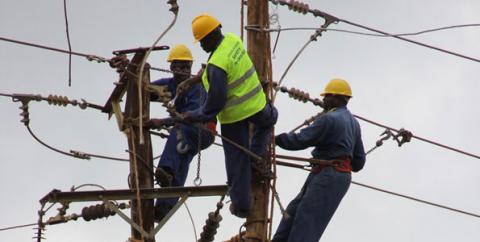The Rural Electrification Agency (REA), says it is supporting 250,000 households with electric mobility, mini-grids, and home systems to boost electricity in the country in 2024.
Malam Mutari Ibrahim, the Director Promotion and Outreach (PIO) said this in a statement in Abuja.
“In response to subsidy removal, REA is implementing interventions to develop electric mobility, mini-grids, distribute home systems, deploy streetlights, potentially supporting up to 250,000 households in the coming year.”
Ibrahim said that the agency had equally deployed more than 1,650 Kilo Metres (KM) of solar streetlights, improving power, security, and economic growth in rural areas, ”he said.
Ibrahim said that the agency had equally deployed more than 1,650 Kilo Metres (KM) of solar streetlights, improving power, security, and economic growth in rural areas, ”he said.
He said that REA also completed 1,403 projects under the capital budget, delivering solar streetlights, mini-grid projects, standalone home systems, and grid extension works.
“Through various programmes, including Energisng Education Programme. Energising Agriculture Programme beyond COVID-19, and Economic Clusters, REA delivered more than 65 Mega Watts (MW) of power across Nigeria’s six geo-political zones.
“The agency has delivered more than 500MW of power, electrified numerous communities, created 500,000 new jobs, and attracted over two billion dollars in investments in the renewable energy sector over the past decade.
”In advancing these achievements, we have established partnerships with the World Bank, the African Development Bank, the Global Alliance for People and Planet (GEAPP),” he said.
“The agency has delivered more than 500MW of power, electrified numerous communities, created 500,000 new jobs, and attracted over two billion dollars in investments in the renewable energy sector over the past decade.
”In advancing these achievements, we have established partnerships with the World Bank, the African Development Bank, the Global Alliance for People and Planet (GEAPP),” he said.
Other partnerships secured are with Rocky Mountain Institute (RMI), Japan International Cooperation Agency (JICA), Sustainable Energy for ALL (SE4ALL), Agence Française de Développement (AFD), and the United Kingdom Nigeria Infrastructure Advisory Facility (UKNIAF).
He said that the agency also secured partnership with the European Union, the United Nations Industrial Development Organisation (UNIDO), the Global Environment Facility (GEF), and the United States Agency for International Development (USAID).
‘Others are the United Nations Development Programme (UNDP), and the Korean Institute of Advancement of Technology (KIAT)
‘Others are the United Nations Development Programme (UNDP), and the Korean Institute of Advancement of Technology (KIAT)
”In 2022, as part of the National Poverty Reduction and Growth Strategy (NPRGS) Programme, REA secured an additional four billion in capital injection grants.
“To provide clean power standalone home systems to more than 50,000 locations, including rural homes, micro-businesses, schools, and faith-based institutions,” he said.
“To provide clean power standalone home systems to more than 50,000 locations, including rural homes, micro-businesses, schools, and faith-based institutions,” he said.
Ibrahim said that from 2020 to date, REA had provided power to more than 7.5 million people, including 1.5 million households, delivering 130 Mini-Grid Projects, including 1.3 million standalone home systems.
According to him, most recently, the Nigeria Electrification Project (NEP), REA negotiated and secured the advance approval of a 750 million dollars facility with the World Bank.
According to him, most recently, the Nigeria Electrification Project (NEP), REA negotiated and secured the advance approval of a 750 million dollars facility with the World Bank.
The aim he said was to expand renewable and rural electrification initiatives, providing additional resources to Nigeria during a challenging period.
Ibrahim said that Mr Salihijo Ahmad, the current Managing Director of the agency, had been a steadfast leader who has tirelessly guided REA through challenging times.
“Even in the face of internal, external pressures, and resistance to anti-corruption efforts.
“Even in the face of internal, external pressures, and resistance to anti-corruption efforts.
“Upon assumption of office, Ahmad encountered a myriad of unresolved staff issues within the agency.
“Recognising the immense challenge of repositioning the agency for effective project delivery, human resources became a pivotal consideration. In response,
“He wasted no time in addressing concerns related to the organisation’s processes, structure, and staff welfare, intending to foster a conducive work environment for optimal performance,” he said.
According to him, his first step is to initiate a comprehensive institutional assessment and appraisal of the agency, carried out by a globally renowned organisational re-engineering firm.
According to him, his first step is to initiate a comprehensive institutional assessment and appraisal of the agency, carried out by a globally renowned organisational re-engineering firm.
He said that the assessment rigorously evaluated the agency’s project delivery, institutional structure, and processes to determine its capacity to meet its mandate.
“The recommendations from the assessment were meticulously reviewed and approved by the agency’s board and the minister before being put into action, resulting in significant accomplishments.
“Over the past few months, we have collaborated closely with the ministry of power, National Assembly, anti-corruption agencies, and process organisations to initiate further reforms within REA in spite of numerous obstacles,” he said. (NAN)
“Over the past few months, we have collaborated closely with the ministry of power, National Assembly, anti-corruption agencies, and process organisations to initiate further reforms within REA in spite of numerous obstacles,” he said. (NAN)


